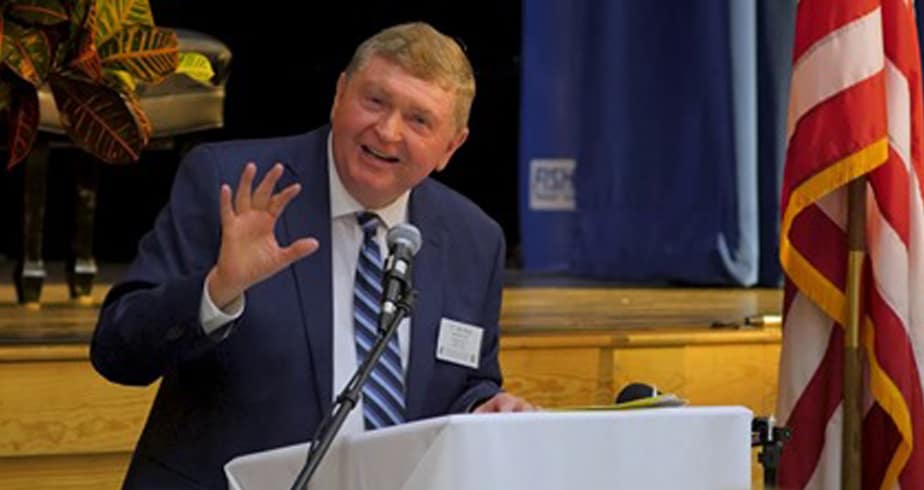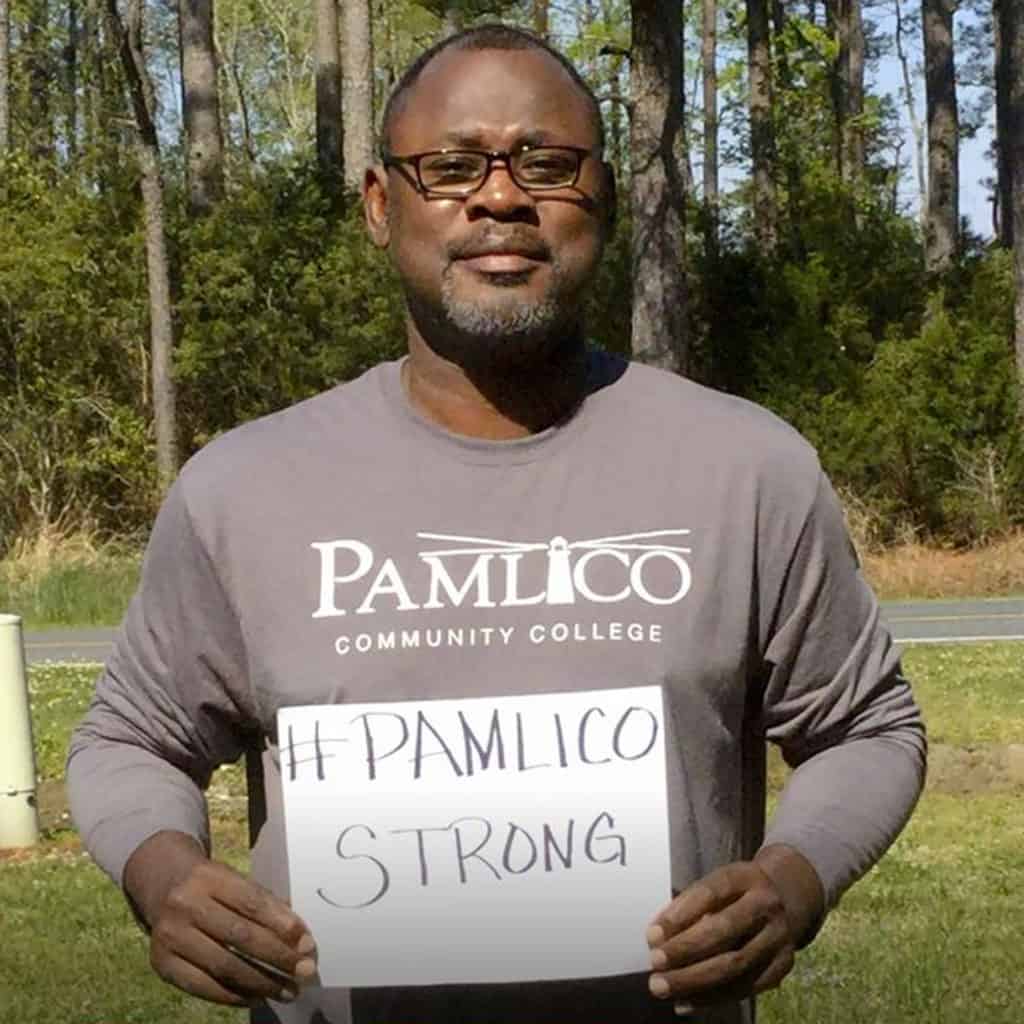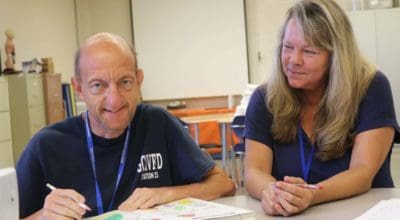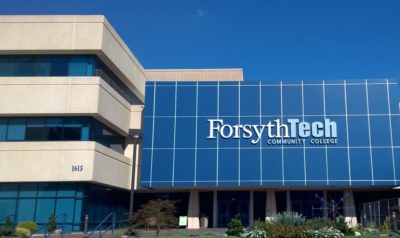

Pamlico Community College (PCC) is the smallest community college in North Carolina. Nestled in a small, rural county, its headcount was 846 as the spring semester began. The main campus is in Grantsboro, a town of 688 residents in the 2010 Census, and a town that must have felt a world away from Seattle, where the first U.S. case of COVID-19 was diagnosed in January.
PCC is also only a half-hour from the larger Craven Community College — a proximity that presents its own challenges in recruiting students, as my colleague Liz Bell reported after our initial visit to Pamlico.
As we began to cover the story of how the 58 community colleges were responding to the COVID-19 pandemic, I reached out to PCC President Jim Ross to see how the school was tackling its day-to-day business during this challenging time.
Ross said he began to meet with his leadership team in February to discuss their plans in case the pandemic came. At the time, the college served 48% of its courses online, but Ross thought it might need to prepare to make it 100%. He told his team to prepare to shift the college’s operations to a remote work model, and to prepare faculty to offer their courses online.
I asked Ross whether Pamlico’s size made the task more challenging. “Staffing and funding resources are, of course, more limited because of our size,” he said. “But one advantage of our small size is nimbleness, giving us a greater ability to effect certain changes more quickly. Another important advantage is in communications, where we can talk to and listen to a large percentage of our PCC family in a short period of time about an issue like this.”
By late February, Ross came to his leadership team with a set of questions about the challenges of seamlessly transforming their seated classes to online instruction:
- How many classes can we transition?
- How many faculty can adjust to online from seated? How quickly?
- How many students can adjust to this? How will they fare?
- Do we need to purchase anything to help make this possible?
Ross also sent a message to his team: “Please keep monitoring all articles I send you on this. It is looking increasingly likely to me that we will be impacted by this to some degree. We will hope and pray it is not a severe impact. We must be prepared, however, for the worst case scenario in case we face it. Being fully prepared will allow us to do so with confidence that our college will survive it well and emerge from it afterwards with a bright future.”
A few elements of PCC’s prior work smoothed the way.
Over the preceding four years, every instructor participated in orientation sessions for Moodle, an online learning platform that provides course management for instructors. PCC also had established an office designed to allow faculty to produce high-quality online material. And it had made it mandatory that each seated course include at least one online component.
The biggest roadblock to the online transition proved to be lab hours for welding, cosmetology and esthetics — just as it has been for colleges across the state.
The college purchased a program for welding lab hours from Amazon Web Services, and it is allowing lab hours via Zoom for the cosmetology program. However, each of the spring courses in welding, electronics, and cosmetology will need to meet in the summer to complete the required hours of face-to-face lab work.
Internet connectivity remains a challenge
Internet access and affordability has been an issue in rural North Carolina for decades, but attention on the issue exploded when the pandemic came, as work and education moved more online for many.
“It’s pretty bad!” Ross said when I asked about internet access in PCC’s service area. “That is a downside of living in a rural area with many pockets of low population density … lack of service or poor service in many areas. Add to that the issue of some student households not being able to afford internet service even when it is available.”
Those challenges affect day-to-day learning as well.
Ross laid it out plainly: “Students who had relied on a college computer lab to complete assignments have been scrambling to transition to using their smartphones, their children’s computers, or borrowed devices. Finding WiFi hotspots for those without internet service has also been a challenge. Students in seated classes accustomed to using only one component of Moodle faced a learning curve transitioning to all Moodle. And many students have reported missing face-to-face interactions.”
PCC has applied funds to try to meet the challenge. It has expanded access to its Wi-Fi networks and begun to allow the general public to begin accessing the internet from its parking lots as well. The college also set up an emergency fund from its foundation that provides enough money for students to buy a tablet if they need a device. The college has also worked to frequently communicate the availability of resources to the student body.
PCC probably will use some of its recent CARES Act funding to expand access and connectivity, Ross said. Potential uses include increasing the number of laptops on hand to lend to students, and raising the number of Wi-Fi hotspot devices.
Ross said the college also may use CARES Act funding to increase the ability of key staff to work at home if need be with additional technology and equipment, to strengthen its IT infrastructure, and to invest in student success capabilities in early alert, tutoring, and mentoring services. The college is even exploring increasing library programs to help online students in challenging subject areas, and exploring new ways to allow students to use these services remotely.
Looking ahead
Ross impressed us during our initial visit as hopeful by nature. In fact, he told my colleague that he is a “card-carrying optimist.”
When I asked him whether he remains an optimist, he responded: “The positive extraordinary teamwork has been inspiring. This teamwork and the college’s very early steps by all divisions several weeks ago to prepare for worst-case scenarios from the coronavirus have been keys to allowing our college to continue to be fully operational while maintaining excellence. By all accounts I have received, the overall instruction to our students remains high-quality, and the overall service to our students also remains high-quality.


“And we will indeed get through this. This too shall pass. Daily, I remind myself to never miss an opportunity to be kind and compassionate to all I encounter, and I regularly share that message to our employees, trustees and community partners. I am also reminding our employees to be kind and gentle to themselves, telling them they don’t have to be perfect, to do their best in all they do and then declare victory.”
Despite his optimism, Ross said the grave health threat of the virus for students and employees keeps him up at night. And he acknowledged that as he looks ahead, he remains concerned that the loss of revenue for the state due to the economic meltdown will produce significant impacts to the state budget that will ripple down to all 58 community colleges.
PCC will begin its summer term on May 26 with almost all courses being offered online. The college, however, is quickly moving to offer face-to-face classes in a handful of subject areas after Gov. Roy Cooper’s administration laid out a plan to relax some of the state’s shelter-in-place guidelines. PCC will now offer in-person instruction for welding curriculum classes, allied health curriculum and continuing education classes. Ross predicts an increase in summer enrollment due to this shift.
PCC’s planning for fall includes a full complement of courses that will be taught in person, as well as expanded online offerings. It will have a plan to shift all in-person courses to online offerings if the pandemic resurges.
And Ross continued to strike an optimistic note.
“I’m just trying to stay focused on enjoying every aspect of life, the beautiful spring weather, the strength I derive from loved ones,” he said. “I know we will prevail in the war against this virus and, as a team, emerge on the other side of this challenge even better at making lives better. I continue to be honored to serve this great college as its president.”





